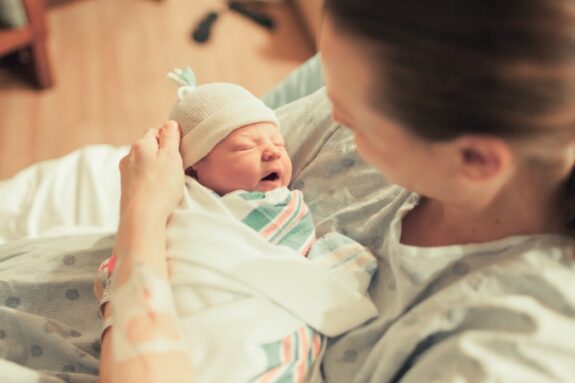Becoming a new parent comes with a long list of stresses. The learning curve can sometimes be taxing as are the sleepless nights. For these reasons, we were not surprised by the findings of a new study. According to the research, a third of first-time moms show anxiety symptoms and say anxiety and adjustment disorders after welcoming their first child.
The study published in the Journal of Affective Disorder found that 17 percent of first-time fathers also found it difficult to adjust to the new life the first six months after the baby’s birth.
Dr Karen Wynter, from the Jean Hailes Research Unit at Monash University said that the anxiety and adjustment issues were found to be higher than expected.
“Most people think of post-natal depression as the main issue for new parents, but we found depression is not nearly as prevalent as anxiety,” Dr Wynter said. “I think the research shows that we also need to pay more attention to new fathers because some of them will have problems adjusting to a new baby in the house. But I don’t think we are including men and asking them how they’re managing as much as we should at the moment.”
The study was conducted on 172 couples in Australia, from rural and metro areas and from different socio-economic backgrounds. The couples were interviewed separately four weeks after their baby’s birth and then again at six months of age.
The researchers observed if the mother and father were showing any signs of depression, anxiety, or adjustment disorders.
Dr. Wynter explains that at work things are usually predictable and individuals are confident in the skills that are necessary for their career. But with a baby especially when they are first-time parents, the adjustments needed may take time.
“A baby doesn’t come with a manual to help new parents manage and parents may feel less confident about caring for a baby than about managing tasks at work. One might expect some adjustment issues and anxiety – but around a third of women and almost a fifth of men in the study reported that they were experiencing enough anxiety symptoms to interfere with their daily life. We were surprised to find that much anxiety.”
She says it is important that new parents understand that anxiety may be an issue after a baby’s birth. She suggests a screening process to detect anxiety as well.
“It’s great that in Australia we screen new mothers for postnatal depression, but I would like to see a screening process for anxiety, too. I’d also like to see men included in at least one post-natal visit with their GP or with the maternal and child health nurse to check on how they are doing,” Dr Wynter said.
“We don’t know how many of these cases of adjustment disorders with anxiety or depression symptoms would progress to clinical diagnoses of anxiety or depression if left unmanaged. I think we can safely say that at least some of them would, which is not good for mum, dad or baby.”
Even if there are no screenings, the researcher suggests couples to ask each other how they are feeling and managing with the baby around.
“Previously our research has shown that if men and women are critical towards each other it can increase the incidence of depression significantly. If couples are gentle and loving it is protective against depression and anxiety symptoms,” Dr Wynter said.
She also suggests that the GPs and nurses could help too.
“Health professionals, such as GPs and maternal and child health nurses can also help couples with a period of ‘watchful waiting’. This is where new parents are monitored during regular visits that focus on them, as well as their baby, so it’s easier to recognize when someone is struggling with anxiety or with adjusting to parenthood.”







